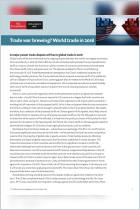Join getAbstract to access the summary!

Join getAbstract to access the summary!
Northern Finance Institute
With the US-China Trade War on Pause, What Will China's Economy Look Like in 2019?
China Finance 40 Forum, 2018
What's inside?
What can China do to sustain its economic growth in times of uncertainty due to the US-China trade war?
Recommendation
At the beginning of December 2018, US president Donald Trump and Chinese president Xi Jinping met in Argentina during the G20 summit and agreed to a 90-day truce on the trade war. During this temporary halt on increasing tariffs, China and the United States will try to flesh out the terms of cooperation in the trading of commercial products as well as information technology. The Northern Financial Institute analyzes the trade war’s impact up until January 2019 and explains what domestic issues China needs to tackle during the temporary relief of outside pressures. This short briefing provides helpful insights into how China views the trade war and where the country might be heading.
Summary
About the Author
The Northern Financial Institute is a think tank that focuses on financial policies.



















Comment on this summary